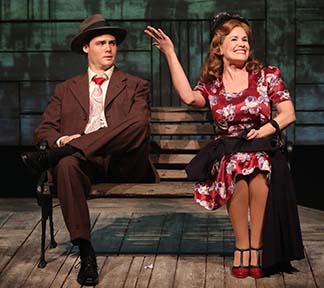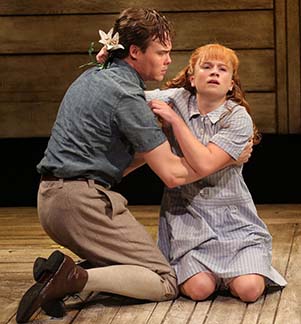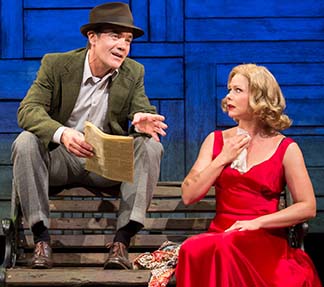By Lucy Komisar
Desire is a collection of plays by modern writers who base the works on Tennessee Williams short stories dealing with various aspects of sexual desire, beginning with young first love, moving through various aspects of homosexuality, touching on repressed desire, and finishing with a full blown graphic orgasm.
Most are at least interesting, a few are stand-outs, and a couple should have been left between book covers. The performances by members of The Acting Company are excellent. Michael Wilson’s direction is sensitive and subtle.
I look at the plays in the chronology of Williams writing the stories, because they indicate what was concerning him at the time, though they are not this order in the play. Most occur in the South.

Rebecca Gilman‘s “The field of blue children,” from the 1939 story, is an often funny take-down of college kids at a school in Tuscaloosa, Mississippi. Gilman transfers the time to the present, with obvious alterations, including a black student.
Layley (the funny Megan Bartle) has joined a poetry class, because she thinks it will help her with words. She becomes interested in Dylan (John Skelley), who is a real (aspiring) poet, and he falls for her.
The sex scene is feminist: instead of him pouncing on her, she invites him to kiss her and he then provides some extended and apparently very good oral sex – under her long dress. She admits, “I have a boyfriend, should we stop. But I don‘t like him.” During the sex, perhaps to deny what is happening, she talks about a football game and a pig roast. So, does she ditch her sorority life and conventional beau? The dénouement is quite funny.
I liked best “You lied to me about Centralia,” John Guare‘s liberal retelling of “Portrait of a Girl in Glass” (1948), which expands on characters and events from “The Glass Menagerie,” produced in 1944.

It deals subtly with homosexuality, which Williams probably felt he could not write about so openly for the theater of the time. (His more obviously homosexual Vieux Carré was produced in 1977.)
It‘s still St. Louis, 1937. Betty (excellently portrayed by Megan Bartle) has gone to the next town to ask her rich uncle for $600 for down payment for the house she wants to buy with her fiancé, Jim (Mickey Theis). She is surprised when a black man she took for a servant is treated as the uncle‘s equal. And that the lady to whom the uncle has reportedly been engaged to for years is conveniently out of town.
Met by Jim on her return, she tells him, “Something criminal is going on in my uncle‘s house.”
Jim tells her that he has had dinner at the home of Shakespeare, a shoe warehouse colleague who interests him because he writes poetry. Dancing with his sister at the house, they knocked down some glass pieces on a shelf and she handed to him the head of a glass unicorn. Not prequel or sequel but out-takes of the play that Williams might have included if he could.
I didn‘t like “Desire quenched by touch” by Marcus Gardley. It‘s from “Desire and the Black Masseur” (1948), here advanced to New Orleans, 1952. I don‘t appreciate on-stage depictions of masochism, homosexual or otherwise. That‘s one that should have stayed a short story.

However, I did like “The resemblance between a violin case and a coffin” by Beth Henley, from the 1950 short story, a charming very Southern tale of what happens when young Roe (the excellent Juliet Brett), a talented teen pianist, is chosen to play a duet with Richard, (Brian Cross), a young violinist.
In a small Mississippi town in the 1920s, Roe and her brother Tom (a fine Mickey Theis) are each others’ best friends, their only friends. They play acting games. (He is Christ.) He is gay. Their relationship changes when she falls in love with Richard, which bewilders her and destroys her confidence. Henley gives this a good feminist touch.
Yes, I’ll choose feminism over masochism every time.
“Oriflamme,” by David Grimm is adapted from a 1974 short story that takes place in St. Louis 1939.

Anna (the very good Liv Rooth), a sexually starved department store clerk, buys a red silk décolleté gown, sashays into a public park and talks up Rodney (Derek Smith), a fellow she encounters perched on a bench examining his racing sheet.
She learns that such flirtations can be dangerous. It‘s a powerful, disturbing production, a look back at a time through the prism of the 70s that showed the suffocation of the small town 30s.
I didn‘t much like “Tent Worms,” by Elizabeth Egloff, from a 1980 story about a writer (Derek Smith) and his editor wife (Liv Rooth) spending the summer at a house in Cape Cod. He passes his days trying to burn out an infestation of tent worms. She points out that the two have come to the house for years and that the worms come only in August. I didn‘t see the point. The protagonist has writer’s block. Did Williams as a writer feel eaten by worms? It’s a metaphor that should go up in flames with the house.
Did you notice that none of the love or sex turns out very happy?
“Desire,” Six plays inspired by Tennessee Williams stories, directed by Michael Wilson and presented by members of The Acting Company. Directed by Michael Wilson. 59E59 Street Theatre, 59 East 59th Street, New York. 212-279-4200. Opened Sept 10, 2015, closes Oct 11, 2015.

